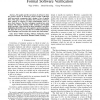Free Online Productivity Tools
i2Speak
i2Symbol
i2OCR
iTex2Img
iWeb2Print
iWeb2Shot
i2Type
iPdf2Split
iPdf2Merge
i2Bopomofo
i2Arabic
i2Style
i2Image
i2PDF
iLatex2Rtf
Sci2ools
TCAD
2008
2008
A Survey of Automated Techniques for Formal Software Verification
The quality and the correctness of software is often the greatest concern in electronic systems. Formal verification tools can provide a guarantee that a design is free of specific flaws. This paper surveys algorithms that perform automatic, static analysis of software to detect programming errors or prove their absence. The three techniques considered are static with abstract domains, model checking, and bounded model checking. A short tutorial on these techniques is provided, highlighting their differences when applied to practical problems. The paper also surveys the tools that are available implementing these techniques, and describes their merits and shortcomings.
| Added | 15 Dec 2010 |
| Updated | 15 Dec 2010 |
| Type | Journal |
| Year | 2008 |
| Where | TCAD |
| Authors | Vijay D'Silva, Daniel Kroening, Georg Weissenbacher |
Comments (0)

